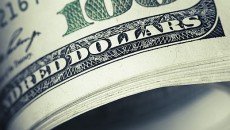Agreement On Debt Deal Reached; Markets Expect Deal To Become A Bill
Minutes before making his way to the White House briefing room to announce to the world that a deal had been made on addressing the nation’s debt woes after weeks of political confrontation, President Obama issued a conference call with leading Democrats and Republicans in the House and Senate to make sure the deal’s parameters had been intact. The White House statement was issued Sunday night, just two days before the August 2nd deadline the Treasury Department gave Congressional leaders to raise the $14.29 trillion debt ceiling in order to avoid a default on government debt obligations. “The leaders of both parties in both chambers have reached an agreement that will reduce the deficit and avoid default,” the President said. “This compromise does make a serious down payment on the deficit-reduction we need. Most importantly, it will allow us to avoid default.”
In early trading, stocks rose in U.S. and Asian markets after the Sunday announcement. The DJIA rose 94 points to 12,237 in early trading after last week the index posted its biggest weekly loss since May 2010, mainly due to the uncertainty of whether officials in Washington could reach an agreement over the raising of the nation’s debt ceiling. The S&P 500 gained 15 points to 1,307 and the NASDAQ gained 39 points to 2,794. Gold futures were lower from Friday’s record high; the U.S. dollar fell against the euro and Japanese yen while making gains against the Swiss franc.
Monday’s positive gains in equities reveal market expectation that Congress will place a bill, relating to Sunday’s negotiated deal, on the President’s desk by Tuesday that will raise the nation’s debt ceiling and cut $2.4 trillion of government spending over the next ten years. Additional terms of the deal would raise the debt limit in two installments with the first immediate installment raising the debt ceiling by $900 billion. A “super-committee” of twelve congressional leaders, six Democrats and six Republicans, will be left with the duty of coming up with an additional $1.5 trillion in deficit reduction. This $1.5 trillion would possibly come from a tax overhaul and adjustments to safety-net programs. A Republican-added measure to the plan: the super-committee must come up with at least $1.2 trillion in deficit reduction by November 23rd, or have congressional approval of the committee’s proposals by December 23rd. If either of these two measures is not met by their respective deadlines, then a pre-determined set of spending cuts would automatically kick in. These pre-determined spending cuts came with concessions from both political parties, with spending cuts in military spending and Medicare payments to health-care providers.
What became a highly publicized showdown between President Barack Obama and House Speaker John Boehner, turned out to leave those on opposite sides of the political spectrum, liberal Democrats and conservative Republicans, disappointed with the implications the entire negotiated deal leaves for America. In addressing the U.S. government’s looming debt and deficit, Republicans have advocated deficit reduction by way of spending cuts to social programs such as Social Security and Medicare, while the Democrats have campaigned for tax increases on wealthy individuals and corporations as a viable solution. The deal eventually came down to a compromise that will raise the debt ceiling by $2.4 trillion with spending cuts amounting to roughly the same amount affecting social programs and military spending, that will not be initiated until 2013. Markets will now focus on the actions of credit rating agencies (S&P, Moody’s) as they await the details of the debt plan; S&P threatened to downgrade the credit rating of the U.S. government if the parameters of the debt deal were not “credible”.
– Shaun Hoyes
Article submitted by: Shaun Hoyes of the Capital Markets Lab (CML). To learn more about the Capital Markets Lab (CML) please visit https://business.fiu.edu/capital-markets-lab/.




